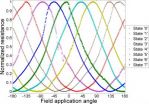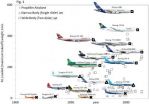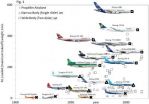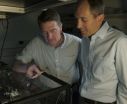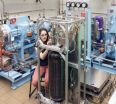(Press-News.org) Heading into the war room to fire up the troops? Declaring war on the competition to boost sales? Well, CEO, you might want to tamp down them's fightin' words—you could be shooting yourself in the foot.
A new Brigham Young University business study finds that bosses who try to motivate their employees with violent rhetoric—think of Steve Jobs declaring "thermonuclear war" on Samsung—end up motivating rival employees to play dirty.
"Business executives use violent language all the time," said David Wood, BYU professor of accounting and one of two BYU authors on the paper. "They say, 'We're going to kill the competition,' or 'We're going to war.' This study shows they should think twice about what they're saying."
Surprisingly, the study found that when an employee's own CEO uses violent rhetoric, those employees are less likely to make unethical decisions. Either way, the research shows clear evidence that violent rhetoric influences ethical decision making—for better or for worse.
Wood, BYU colleague Josh Gubler, a political science professor, and coauthor Nathan Kalmoe carried out two experiments with 269 participants for the study. In the first experiment they showed half the subjects this motivational message from a CEO:
To this end, I am declaring war on the competition in an effort to increase our market share. I want you to fight for every customer and do whatever it takes to win this battle. To motivate you to fight for this cause, I will be rewarding the top ten sales associates, and a guest, an all-expense paid vacation to Hawaii."
The other half of the subjects got the same message but with the words "war," "fight" and "battle" replaced by "all-out effort," "compete" and "competition," respectively. Researchers then assessed the subjects' likelihood to engage in unethical behavior—in this case, posting fake negative reviews for the competition's product.
They found that when the source of violent rhetoric was the rival CEO, employees were significantly more likely to post fake negative reviews and ratings about the competition.
"What's disconcerting is that people don't think they're being unethical in these situations," Wood said. "You can't just say, 'OK people, you need to be better now, don't be bad,' because they don't think they're being bad."
In the second part of the study, researchers tested whether participants would bend internal sales policies (no selling to people with credit scores below 600) to boost sales figures after receiving an email from their manager. Again half of the subjects received a message with violent rhetoric.
The results once again showed that the use of violent rhetoric by leadership impacted the ethical decision making of the employees.
"There has been a lot of research on the effects of violence and violent media on aggressive behavior," Gubler said. "This research shows it goes further: It affects your willingness to lie and to cheat and to bend moral rules. There are serious implications for CEOs."
Adds Wood: "Our environment impacts our choices at much more subtle levels than we realize."
INFORMATION:
CEOs who motivate with 'fightin' words' shoot themselves in the foot
Research shows violent rhetoric affects employee ethics
2014-07-22
ELSE PRESS RELEASES FROM THIS DATE:
Dangers of desert dust: New diagnostic tool for valley fever
2014-07-22
VIDEO:
In this video, biodesign researcher Krupa Navalkar describes a new diagnostic technique for pinpointing Valley Fever.
Click here for more information.
On July 5, 2011, a massive wall of dust, ("haboob," in Arabic), blanketed Phoenix, Arizona, creating an awesome spectacle, (or stubborn nuisance, depending on your perspective). Dust storms are a common occurrence in the arid desert environments of the American Southwest.
But windborne dust can be a serious health risk, ...
A new multi-bit 'spin' for MRAM storage
2014-07-22
WASHINGTON D.C., June 22, 2014 -- Interest in magnetic random access memory (MRAM) is escalating, thanks to demand for fast, low-cost, nonvolatile, low-consumption, secure memory devices. MRAM, which relies on manipulating the magnetization of materials for data storage rather than electronic charges, boasts all of these advantages as an emerging technology, but so far it hasn't been able to match flash memory in terms of storage density.
In the journal Applied Physics Letters, from AIP Publishing, a France-U.S. research team reports an intriguing new multi-bit MRAM storage ...
Fly-inspired sound detector
2014-07-22
WASHINGTON D.C., June 22, 2014 – Even within a phylum so full of mean little creatures, the yellow-colored Ormia ochracea fly is distinguished among other arthropods for its cruelty -- at least to crickets. Native to the southeastern U.S. states and Central America, the fly is a most predatory sort of parasite. It swoops onto the back of a singing male cricket, deposits a smear of larvae, and leaves its wicked brood to invade, kill and consume the cricket from inside out.
None of this would be possible without the fly's ability to find a cricket -- the cornerstone of ...
Law of physics governs airplane evolution
2014-07-22
DURHAM, N.C. -- Researchers believe they now know why the supersonic trans-Atlantic Concorde aircraft went the way of the dodo -- it hit an evolutionary cul-de-sac.
In a new study, Adrian Bejan, professor of mechanical engineering and materials science at Duke University, shows that a law of physics he penned more than two decades ago helps explain the evolution of passenger airplanes from the small, propeller-driven DC-3s of yore to today's behemoth Boeing 787s. The analysis also provides insights into how aerospace companies can develop successful future designs.
The ...
The evolution of airplanes
2014-07-22
WASHINGTON D.C. July 22, 2014 -- One of the traditional arguments against Darwinian evolution has been that no one can confirm the process exists because it occurs on a time scale immensely greater than a human lifetime. Adrian Bejan, the J. A. Jones Distinguished Professor of Mechanical Engineering at Duke University, has disagreed with that notion ever since 1996 when he discovered the Constructal Law, a fundamental principle of physics that underlies the evolution of flow systems as they change in design over time.
In a new paper in the Journal of Applied Physics, ...
Bats use polarized light to navigate
2014-07-22
Scientists have discovered that greater mouse-eared bats use polarisation patterns in the sky to navigate – the first mammal that's known to do this.
The bats use the way the Sun's light is scattered in the atmosphere at sunset to calibrate their internal magnetic compass, which helps them to fly in the right direction, a study published in Nature Communications has shown.
Despite this breakthrough, researchers have no idea how they manage to detect polarised light.
'We know that other animals use polarisation patterns in the sky, and we have at least some idea ...
'Comb on a chip' powers new NIST/Caltech atomic clock design
2014-07-22
Researchers from the National Institute of Standards and Technology (NIST) and California Institute of Technology (Caltech) have demonstrated a new design for an atomic clock that is based on a chip-scale frequency comb, or a microcomb.
The microcomb clock, featured on the cover of the inaugural issue of the new journal Optica,* is the first demonstration of all-optical control of the microcomb, and its accurate conversion of optical frequencies to lower microwave frequencies. (Optical frequencies are too high to count;microwave frequencies can be counted with electronics.)
The ...
Mount Sinai scientists and international team shed new light on schizophrenia
2014-07-22
NEW YORK, NY -- As part of a multinational, collaborative effort, researchers from the Icahn School of Medicine at Mount Sinai have helped identify over 100 locations in the human genome associated with the risk of developing schizophrenia, in the largest genomic study published on any psychiatric disorder to date, conducted with 80,000 people. The findings, published online in Nature, point to biological mechanisms and pathways that may underlie schizophrenia, and could lead to new approaches to treating the disorder, which has seen little innovation in drug development ...
P90X? Why consumers choose high-effort products
2014-07-22
Stuck in traffic? On hold for what seems like an eternity? Consumers often face situations that undermine their feelings of control. According to a new study in the Journal of Consumer Research, when a person's sense of control is threatened, they are more likely to seek out products that require hard work.
"Intuitively, it would seem that feeling a loss of control might cause consumers to seek out a product that does NOT require them to exert very much effort. But we find that consumers actually look to products that require hard work to restore their belief that they ...
Fill 'er up: NIST develops prototype meter test for hydrogen refueling stations
2014-07-22
To support the fair sale of gaseous hydrogen as a vehicle fuel, researchers at the National Institute of Standards and Technology (NIST) have developed a prototype field test standard to test the accuracy of hydrogen fuel dispensers. Once the standard is field tested, it will serve as a model for constructing similar devices for state weights and measures inspectors to use.
Three automakers plan to begin selling hydrogen-fueled vehicles to consumers in 2015. The state of California has opened nine refueling stations and is funding the construction of an additional 28 ...
LAST 30 PRESS RELEASES:
White House autism briefing linked to swift shifts in prescribing patterns, study finds
Specialist palliative care can save the NHS up to £8,000 per person and improves quality of life
New research warns charities against ‘AI shortcut’ to empathy
Cannabis compounds show promise in fighting fatty liver disease
Study in mice reveals the brain circuits behind why we help others
Online forum to explore how organic carbon amendments can improve soil health while storing carbon
Turning agricultural plastic waste into valuable chemicals with biochar catalysts
Hidden viral networks in soil microplastics may shape the future of sustainable agriculture
Americans don’t just fear driverless cars will crash — they fear mass job losses
Mayo Clinic researchers find combination therapy reduces effects of ‘zombie cells’ in diabetic kidney disease
Preventing breast cancer resistance to CDK4/6 inhibitors using genomic findings
Carbon nanotube fiber ‘textile’ heaters could help industry electrify high-temperature gas heating
Improving your biological age gap is associated with better brain health
Learning makes brain cells work together, not apart
Engineers improve infrared devices using century-old materials
Physicists mathematically create the first ‘ideal glass’
Microbe exposure may not protect against developing allergic disease
Forest damage in Europe to rise by around 20% by 2100 even if warming is limited to 2°C
Rapid population growth helped koala’s recovery from severe genetic bottleneck
CAR-expressing astrocytes target and clear amyloid-β in mouse model of Alzheimer’s disease
Unique Rubisco subunit boosts carbon assimilation in land plants
Climate change will drive increasing forest disturbances across Europe throughout the next century
Enhanced brain cells clear away dementia-related proteins
This odd little plant could help turbocharge crop yields
Flipped chromosomal segments drive natural selection
Whole-genome study of koalas transforms how we understand genetic risk in endangered species
Worcester Polytechnic Institute identifies new tool for predicting Alzheimer’s disease
HSS studies highlight advantages of osseointegration for people with an amputation
Buck Institute launches Healthspan Horizons to turn long-term health data into Actionable healthspan insights
University of Ottawa Heart Institute, the University of Ottawa and McGill University launch ARCHIMEDES to advance health research in Canada
[Press-News.org] CEOs who motivate with 'fightin' words' shoot themselves in the footResearch shows violent rhetoric affects employee ethics

